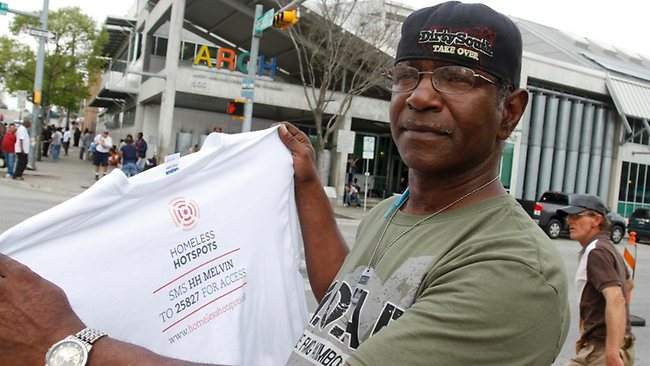Homeless People Used as WiFi Hotspots at SXSW
BHH Labs introduces Homeless Hotspots, a controversial homeless employment initiative, at Austin's SXSW Festival.
South By Southwest's annual SXSW Festival offers technology and music enthusiasts the chance to convene and discuss the next big bands, apps, social networks and start-ups. Previous festivals have featured not-yet popular Twitter and Facebook, but one of the initiatives at this year's festivities, held in Austin, Texas, has sparked an ethical controversy.
The instigator is Homeless Hotspots, a newly introduced initiative by ad agency BBH Labs,which has employed 13 local homeless people as 'Hotspot Managers'. Equipped with a wireless router, and clad in a "I'm a 4G Hotspot" t-shirt, each manager was paid to remain in a strategic place throughout SXSW, which is known for its mobile coverage black spots and lack of wireless internet, offering festival-goers wireless internet access for a small charge.
Melvin Hughes (pictured above), a Homeless Hotspots employee, reports earning US$20 for each of the four 6-hour shifts he completed last weekend. Hughes keeps all of his earnings in full, and also has the opportunity to collect donations from generous festival-goers. Saneel Radia, the program's organiser, sought to clarify the program's payment methods on the company's blog, stating: "These volunteers were guaranteed [to] make at least $50/day, for a maximum of 6 hours work. This amount equates to more than the Texas state minimum wage of $7.25/hr for the same number hours....BBH provides a $20 cash ”stipend” to the volunteers each day regardless of their own sales."
Still, accusations of commodifying and exploiting Austin's homeless contributed to the backlash against Homeless Hotspots. In response to the controversy surrounding the ethics behind the initiative, Radia said, "The worry is that these people are suddenly just hardware, but frankly, I wouldn't have done this if I didn't believe otherwise."
Homeless Hotspots is reportedly modelled off the corner sale of newspapers by homeless people, incorporating the same goals of increasing the self-confidence and self-worth of the vendors. The company's ultimate goal for the initiative, however, is to provide homeless participants with a 'digital writing platform'.





